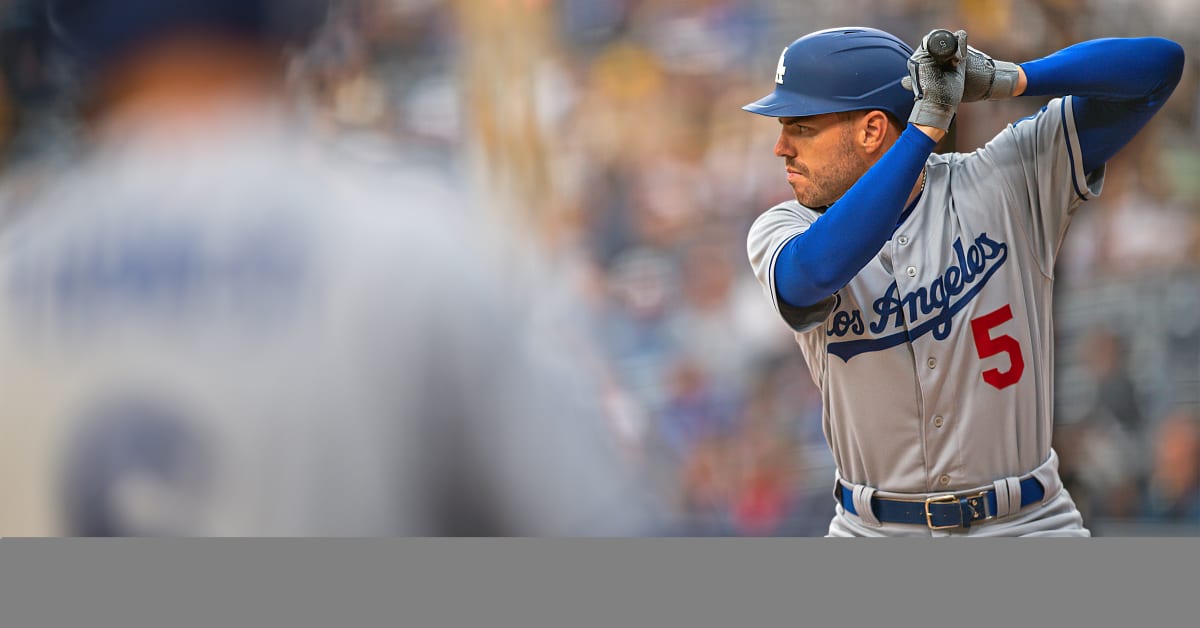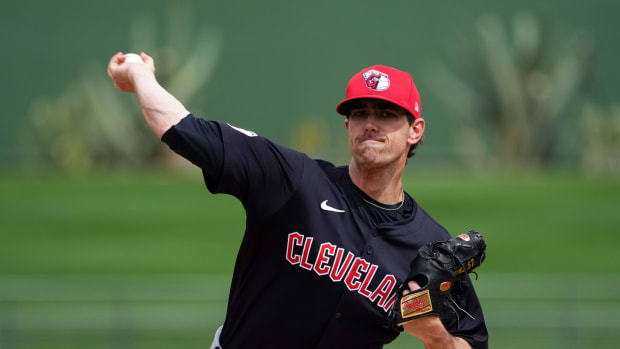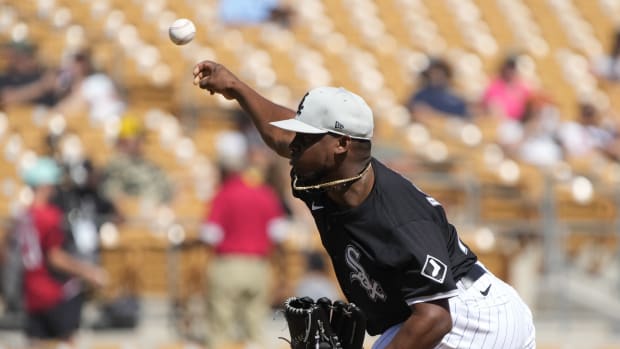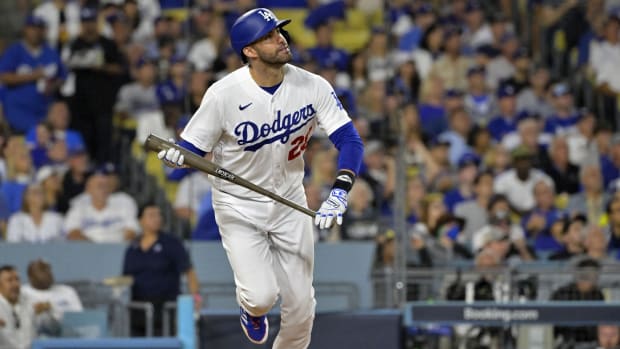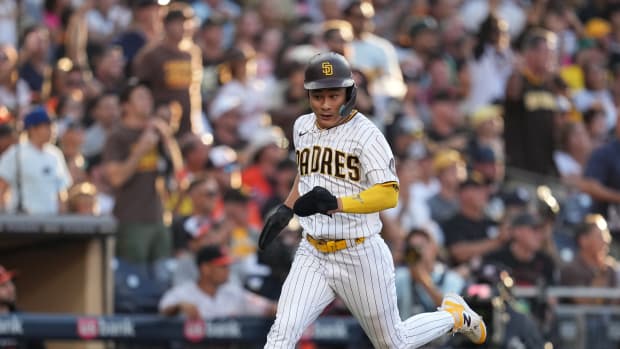The swing is poetry; his swing is perfect. I miss the swing; but we miss Freddie more.
“Give me a second,” Freddie Freeman tells reporters. “I don’t even know if I can get through this.”
On June 24, Freeman, the Dodgers’ All-Star first baseman, returns to Atlanta, where he played 12 years before moving this season to L.A. At a press conference, he chokes back tears and clutches a white towel.
I watch that press conference on my laptop with my 10-year-old daughter, Rose. She has followed Freeman through hundreds of big hits and signature hugs, for opponents and teammates alike. And on one sun-kissed September afternoon against the Red Sox, he even sent Rose a wave, on her birthday.
Freeman, it’s said, is the type who wears his heart on his sleeve. Around his neck, he wears a chain with a cross that unscrews to reveal a strand of hair from his late mother, Rosemary. She died of skin cancer when Freeman was 10.
“She’s with me everywhere I go,” he has said before. But now, back in Atlanta, he can’t get a word out.
I hold Rose’s hand. She squeezes. We root for Freeman to find the right word, any word.
Mary Huhn wakes up one morning in 1926, when she’s 2, and her father, Henry, is gone. By train, she and her mother leave Pittsburgh for Bowerston, Ohio, where Mary grows up on a farm with her grandparents.
There Mary listens to Tigers games on WXYZ. Her hero is the first baseman, No. 5, Hank Greenberg. The Jewish kid from New York. Hammerin’ Hank. When the Tigers are out of town, the radio team re-creates the action from telegraph. Mary closes her eyes and imagines distant cities.
She is told, as a teen, that her father was killed in a car accident outside of Chicago. She is not told the truth, that he simply vanished. She has chores on the farm. She plays basketball for the Bowerston High Trojans, with jerseys of blue and orange. After dinner, she collects all the facts she can from the paper on the Tigers.
Fifty years later, Mary will tell me, her grandson, stories about Greenberg’s 1938 season.
Every swing of the bat, Hank says, is a swat against Hitler. The world readies that summer to set itself aflame. Hank hears the howls. They’re close. At Ford Motors’ Dearborn office, a German vice-consul, on behalf of Hitler, presents Henry Ford with a golden Maltese cross, surrounded by four swastikas. At Madison Square Garden, 20,000-plus American Nazis strike the Sieg Heil. From Woodward Avenue, north of Detroit, Father Coughlin delivers antisemitic rants across U.S. airwaves. But Hank Greenberg locks in. He slugs away. Home run after home run. Fifty-eight for the season. Mary clips boxscores, headlines, photographs.

Huhn, the author’s grandmother, latched onto Greenberg, and her love of baseball stuck in the family for generations.
Courtesy of Jeremy Collins
She graduates high school in 1941 and moves back to Pittsburgh. She falls in love with Bill Troppman, who, like Greenberg, goes to war. By ’45, both return home as Nazi Germany is defeated. Mary and Bill wed. And in Hank Greenberg’s first game back, after four years overseas, he homers. Mary’s heart swells.
In 1947, she becomes a mother, Hank Greenberg a Pirate. And each morning, along the city's North Shore, the sunrise breaks off the waters of the Allegheny.
The body of Henry Huhn is never found.
Freddie Freeman tells this story: He is 8 years old. His dad, Fred, is pitching him batting practice at North Sunrise Little League, in Orange, Calif. Rosemary walks beyond the right-center field fence. Four years earlier she was diagnosed with melanoma, but as Fred grooves one down the middle, Rosemary is healthy.
Freddie steps into his swing. The ball explodes. Soaring, lifting, it heads straight toward her in right center. Father and son call out. She turns. The ball strikes a light pole, just missing her. His first home run. Rosemary cheers; Freddie exhales. She’s the child; he’s the parent. Her joy is his relief.
And every swing of Freddie Freeman’s bat travels this plane, an extension of this moment.
Maggie Troppman—Mary’s daughter; my mother—dodges and ducks elbows and squirms to the front. She is 8 years old, and holding a baseball over the first base line fence at Forbes Field in Pittsburgh she searches for No. 21.
Kids clamor for autographs as the Pirates warm up. Aug. 16, 1960. A doubleheader against the Phillies.
Roberto Clemente gingerly jogs over and takes the ball. Maggie smiles. She wishes him an early happy birthday. From her baseball cards, she knows: Aug. 18, 1934. Clemente smiles.
He asks about her birthday. It follows his, she says, on the next day. Clemente’s smile widens. Handing her back the ball, he wishes Maggie a happy birthday of her own. It is a ritual they will repeat. Summer after summer, Maggie returns; and summer after summer, Clemente signs.

...After Greenberg, Clemente hooked Troppman, who skipped school to watch at Forbes Field.
Neil Leifer/Sports Illustrated
Clemente dazzles with high-wire catches and laser throws home. Maggie clips newspapers, pictures and box scores, adding them to a box under her bed, with her signed memorabilia. Truancy will track her as she finds ways to cheer on the Bucs. (“Throw the book at her,” Mary will tell the principal.)
Maggie feels most at home at Forbes Field, watching No. 21. On her baseball cards they call him “Bob,” even when he insists on “Roberto.” To be Black and Latino in Pittsburgh is to be twice an outsider. So Clemente makes Forbes Field his home. He eludes the press and finds the children.
In his native Puerto Rico he entered the sugarcane fields at age 8. Though baseball was his ticket out, he refuses to forget the children still in those fields, without mercy.
He also has not forgotten Anairis. His 5-year-old sister was playing near an outdoor fire when gasoline spilled and flames leaped and swallowed her silk dress. With burns on over 90% of her body, Anairis died days later. Clemente tells his family that he can feel her beside him.
The Pirates take both games against Philly. Clemente gathers four hits and five RBIs.
Leaving the ballpark, Maggie clutches the ball in one hand and her father with the other.
The air conditioning is out in the office of assistant principal Steve Bernard at J.W. North High, in Riverside, Calif. It’s the Friday of the end of the first week of classes, but Freddie Freeman’s old high school coach at El Modena High, an hour west, answers my call and questions.
“As a player,” Bernard says, “there are not enough adjectives.” And as a person? He describes a young man who was very sensitive when it came to relationships. A kind-hearted kid. A little goofy.
After his mother died, on June 13, 2000, Freeman stayed inside for months. When he and Fred found the ball and bat again, each took a measure of solace in BP. Soon, baseball was all Freddie did. He poured himself into the pastime.
Before one game around the anniversary of Rosemary’s death—Bernard recalls this was either ninth or 10th grade—Freddie went behind the dugout and as his teammates warmed up he came apart.
“I remember trying to console him,” Bernard says, “and not really providing anything. There's nothing you can provide. Nothing you can do. Nothing you can tell him that's going to make that situation better. So I gave him a hug.”
The hug, a simple gesture, must rise from care. So too baseball’s first rule. Keep your eye on the ball.
Bernard remembers that before Freeman’s junior year the team held batting practice with future high-level Division-I pitchers. Both coach and player stood 15 feet away from home plate, looking through the cage’s mesh and the L screen.
“There were all these obstacles, plus the distance—but in the split second the ball was released, Freddie was calling ‘curve,’ ‘changeup,’ ‘curve.’ That’s when I recognized he was extraordinary.”
Now that Freeman is local, with the Dodgers, Bernard gets to hop in his car and drive to catch games. It’s one thing to watch Freeman play ball on TV. At the ballpark, it’s better.
Before Bernard leaves, I ask why a left-handed swing like Freeman’s is more beautiful than a right-handed swing.
“That’s … an unusual question,” Bernard says. “But I know what you’re saying.”
Bernard was a pitcher. A defense-first coach. He wanted to get guys out. He didn’t care how a swing looked. But it does look different, he says. I mention Ohtani, Griffey Jr., Ted Williams. Bernard recalls Carew and Gwynn. He says Freeman’s devotion to going the other way reminds him of Carew.
“The right-handed swing is a little stiffer, a little more violent. The left-handed swing is just smoother.”
The edges sand away. A softer note plays. Behind the dugout, a child cries and a coach gives him a hug.

What is it about a lefty swing like Freeman’s? “That’s … an unusual question,” Bernard says. “But I know what you’re saying.”
Greg Nelson/Sports Illustrated
Mary wakes up in 1971 to a strange sky. Bill has lost his job at J & L Steel. He’s one of thousands. Like smoke from those forsaken stacks, Pittsburgh will spit out 30% of its population in the decades to come.
The loss feels part of a larger ruin, chaos from a bloody decade without end. At the TV studios of WQED, Fred Rogers, a former Presbyterian preschool teacher, talks to puppets and kids about a world of so much change.
Bill and Mary cannot keep the house. They will have to leave. Mary begins the process. Maggie is off at college.
When I was a child, I spoke as a child.
At college, Maggie exchanges love letters with a Reds fan, and each contains box scores. Magic numbers. How much of my existence is owed to Pops, Maz and Manny against Bench, Rose and Concepción?
But back home, packing up, Mary collects Maggie’s boxes of photographs, baseball cards and programs; a signed ball, Pirates yearbooks and newspaper clippings. She heads to the trash bins outside.
But when I became an adult, I put away childish things.
When Maggie comes home and finds out, she puts a hand on her stomach. It is a posture she will resume a year later when Pittsburgh announcer Bob Prince delivers the news. On Dec. 31, 1972, during a humanitarian mission to earthquake survivors in Nicaragua, a plane carrying a member of the Pirates crashes and disappears into the ocean.
Teams of divers search, but the body of Roberto Clemente is never found.
Driving home after the Atlanta press conference, Josh Kliner listens to AM 570 Dodger Talk. What’s up with Freeman? The tears? Can he be a true Dodger? Kliner, now the coach at El Modena, turns the radio off.
“What you have to understand about Freddie is how much he cares,” Kliner says. The fans in Southern California will get that in time. As emotional as Freeman was in Atlanta, I point out, he still went 4-for-12 with three runs, three walks and an RBI, in a series L.A. won 2–1.
“That is the other thing about Freddie,” Kliner says. “His belief in his approach is so strong. I haven’t really been around anyone who could focus and hone in like he does.”

Freeman’s return to Atlanta, in June, left him teary-eyed. “What you have to understand,” says Kliner, “is how much he cares.”
Todd Kirkland/Getty Images
Kliner was an assistant at El Modena during Freeman’s high school career. I ask what makes Freeman’s approach unique.
“It’s so hard to hit a baseball. There’s so much failure. He stays within himself. He hones in on each pitch, each situation. And maintains this belief [in himself], even when he doesn’t see results.”
The care and approach of the player fused into the person. Kliner describes how as Freeman’s local legend grew, he grew kinder. “When kids have a lot of success, the expectations rise, and so can the ego. For Freddie, it was the opposite. Others mattered more, not less.”
I hear the voices of home in the background. As a fellow American public educator on a Friday, I know it’s past time to let Coach Kliner go. But I ask: “Why is a left-handed swing more beautiful than a right?”
He waits and says: “Wish I had an answer to that … but it is.”
We list the great right-handed hitters of this century. Kliner: Pujols, Manny, Edgar Martínez. I add Trout and Judge, Vlad and Cabrera. We both recall Piazza. We both forget A-Rod.
“The right-handed swing is more aggressive,” he says, “more mechanical.”
As an All-American second baseman for Kansas, Kliner drove in 85 runs in 1996 and was named the Big Eight player of the year. He was also a switch hitter.
“I felt it in my swing,” he says. “From the left, I was more fluid, graceful. The bat felt … more majestic.”
Thirty miles to the north, Freeman leans the barrel of his maple bat against his shoulder. BP. He waits. A breeze blows across Chavez Ravine. The approaching leather, from a tannery in Tennessee, is made from Holstein dairy cows in Pennsylvania. Hand-sewn by one of 300 factory workers in Costa Rica, the ball has traveled far even before Freddie Freeman sends it into the California sky.
At Medlock Park, outside Atlanta, I play the hot corner and wear No. 12. I want No. 3, though. We all want No. 3. Dale Murphy is my guy. Dale Murphy is every Little Leaguer’s guy. After games we all change into baby-blue No. 3 T-shirts. Mary and Maggie watch from the stands.
Murphy wins the NL MVP in 1982 and ’83. Nolan Ryan compares him to DiMaggio. He takes the Braves to the playoffs in ’82 and makes the grown-ups around us forget they are so grown up.

Murphy’s Atlanta legend: seven All-Star appearances, two NL MVPs and, notably, in 1988, the Roberto Clemente Award.
Focus on Sport/Getty Images
Between Medlock Park and my home is Elizabeth Smith’s house. We go to the same Sunday school and play on the tire swing. No. 3 is her guy, too. We’re each six years old on March 24, 1983, when a snowstorm hits Atlanta. As Elizabeth walks to a friend’s house, she steps on a downed powerline, dusted by the snow. She’s rushed to the hospital and doctors amputate both her arms and one leg, at the knee. My mom tells me what happened that night as she strokes my hair and scratches my back.
In the hospital, Elizabeth meets Dale Murphy, whose son is undergoing a surgery. Elizabeth is awed. Later that summer she meets him again, this time in the tunnel at Fulton County Stadium, before a game against the Giants.
Here Murphy picks Elizabeth up and holds her. He says he has a few small gifts: a Braves T-shirt and hat, and a baseball signed by the team.
“Why don’t you hit a home run for Elizabeth?” asks Elizabeth’s physical therapist, Colleen Coulter.
Movie magic gives this baseball myth staying power. In The Babe Ruth Story (1948), Ruth sits bedside in ’26 with a sick boy and promises a World Series home run. In truth, Ruth sent that promise by telegraph. In The Pride of the Yankees (’42), Lou Gehrig promises a kid two homers. A sweet tale that never happened.
Colleen Coulter doesn’t need a sappy story. She believes in the urgency of now. In the hospital, after the accident, she debrided Elizabeth’s wounds in a whirlpool. Everyday, she demands that her patients use prosthetics. They have to work through discomfort until it becomes a part of them. She is undaunted, even by a big leaguer. (“I owe my functionality as an adult to that woman,” Elizabeth will tell me years later.)
In the tunnel at Fulton County Stadium, Murphy lowers his head and says he’ll try his best.
Three innings later, his first home run ball sails over the fence and almost hits Henry Aaron’s No. 715 plaque. Elizabeth screams and cheers and tries to catch her breath. Braves 2, Giants 0. A second homer comes in the sixth. No outs. Solo shot, opposite field. Elizabeth closes her eyes against the sun and smiles. Braves 3, Giants 2.
The story of Elizabeth and Dale Murphy runs in the paper. It’s picked up on The Today Show and is told in the pages of Sports Illustrated. For a long time, as a kid, if you asked me the most amazing fact in the universe, I would tell you this story.

In Atlanta, everyone wanted to be No. 3. Elizabeth, after her accident, got a pick-me-up from him.
Courtesy of Elizabeth Smith-Klinger
Once upon a time, Dale Murphy kept a promise. The promise was to a girl who would become a speech pathologist, a wife and a mother to two boys who love Minecraft and Spider-Man. Elizabeth still loves baseball, but she admits there’s not much time to keep up these days.
“I felt bad watching the World Series [last year]. I didn’t know any of these players,” she says, laughing. “I was looking for Dave Justice and Tom Glavine. I was like, ‘Where’s Greg Maddux?’”
She hasn’t shown the ball to her sons yet. It sits in a display case, inside a box, in her metro Atlanta basement. Her family has moved twice in the past decade. You know how it is, she says. Years fly by. Maybe she’ll get it out soon, tell her boys about No. 3 and Colleen Coulter, who every day asked that the impossible be made possible.
“I want to show you something,” says Tom Battista. “It’s a baseball that five people have seen.”
Battista, president of the sports agency AMG, worked 16 years for the Braves, mostly as a California-based scout. He has a searching mind and a background in kinesiology, so that he can both quote Othello and enumerate the 27 bones in the hand. These eclectic powers of observation served him well when he first saw a ninth grader named Freddie Freeman.
“Freddie was taller, he was stronger, he threw harder—but his makeup set him apart,” Battista says.
That makeup, he explains, doesn’t always translate to good kid, good makeup and bad kid, bad makeup. Makeup was the personal alchemy that made a potential big leaguer. For Freeman it was care. His care impacted all he did and everyone on his team. Battista saw it firsthand on the Braves’ scout teams each summer.
With Atlanta, Battista would every year turn in a top-five list to his scouting director and mentor, Roy Clark. The rule was to not bring anyone to Clark until the player was a rising senior. But Battista saw what he saw. Freshman Freddie Freeman. A top prospect in California.
Stop, Roy Clark told him. Cut the s---. No freshmen.
“I’m just telling you,” Battista said, “he’s my guy. He’s a real dude. Never seen anyone like this.”
Each year Battista turned in a list. And each year: Freddie Freeman. “Would you shut up about this guy?” Clark said.
One year, Clark offered Battista a promotion to become the Braves’ West Coast crosschecker—a scout who manages other scouts and corroborates their reports—but Battista declined. He wanted to be the scout who signed Freddie Freeman.
Finally Roy Clark went west, in Freeman’s junior year, and got one look. He turned to Battista and said, “Yep.”
Freeman signed his pro contract on June 10, 2007. He was 17. In the room were Battista, Freeman and his father. After Freddie signed, Battista presented him with a ball to ink. It was not customary, but Battista knew what the moment meant to the Freeman family. And he had an idea what the ball would come to mean. He’d staked his career on it. Freddie smiled and leaned over the baseball and with great deliberation signed his name.

“I want to show you something,” says Battista. “It’s a baseball that five people have seen.”
Courtesy of Tom Battista
Today Battista keeps the ball inside a UV-protected cube in his Westlake Village, Calif., office. He’s shown it to his wife and his stepson. Someday he will give the ball to Freeman’s oldest son, Charlie, who will care for it most.
Before we part, I ask Tom, too, why a left-handed swing is more beautiful than a right-handed swing.
“It’s not,” he says. “Think of diamonds. It’s more rare. That’s all. You don’t see it as often.”
As of 1934, every major league baseball has 108 double stitches. The whole game rests in these red threads. They allow the pitcher to craft a story. A story of velocity. Or deception. The batter waits.
At the microphone in Atlanta, Freeman says that on the way to the park he counted 14 kids wearing his No. 5 Braves jersey. “I never took that for granted.” When he walked into his favorite breakfast spot, Cupanions, not far from Truist Park, all nine people inside gave him a standing ovation. He shakes his head.
He recalls 14-hour bus rides. He names minor league outposts. Myrtle Beach, S.C., Rome, Ga., Pearl, Miss. He thanks the people who helped him by name. He uses we to refer to his family, to the Atlanta press, to former and current Braves, and to the people of Atlanta.
The split-second battle between pitcher and batter is a matter of textual interpretation. See the ball. Read the story. Quick.
Back home, at the microphone, the moment slows for Freddie Freeman. The laces, the interconnected threads of a life in baseball, reveal their pattern.
Ten-year-old Rose Collins takes her seat along the first base line. Game 6 of the 2021 World Series is being broadcast, live from Houston, on the big screen at Truist Park. The lower bowl is packed. The outfield grass is a picnic of fans and families.
I, too, came back to Atlanta, in 2016, after years away. Like Freeman, I kept tearing up. Unlike Freeman, I didn’t want to be there. Atlanta stopped feeling like home when I was 20 and three of my close friends died. Later, being back, I fell into a depression. I was a shadow to my wife, Alice, and to Rose and her 2-year-old sister, Grace. Before long, I found myself at the ballpark with Rose, along that first base line.
Watching baseball made me slow down and be present. Rose was into it. She had questions. But questions I could answer. I told her to keep an eye on the ball, and on Freeman. We watched how he communicated with second baseman Ozzie Albies. We watched him break his wrist in 2017 and come back better. We watched him turn throwing errors into outs and deliver in the clutch. We saw how he picked everyone else up. Rose counted the hugs.

For the author, Freeman and the Braves brought focus—and brought Rose (left) and Grace into the fold.
Courtesy of Jeremy Collins
We learned that Freeman wears long sleeves as protection from the sun. We learned that he had a cancerous mole removed in 2016. (When Rose encourages Grace to wear sunscreen, she summons Freddie’s story.) We learned that the date of Rosemary’s death is inscribed on his cleats. When Freddie had COVID-19, in July ’20, Rose asked daily for an update. Freeman, again, came back stronger and was named 2020 NL MVP. We learned that he donated $125,000 to local school food initiatives and to help pay rent for food-service workers who lost their jobs during the pandemic. On Mother’s Day ’21, we saw him predict and then hit a home run for his wife on Sunday Night Baseball. We learned that year he was nominated for the ’20 Roberto Clemente Award, for his “character, community involvement, philanthropy and positive contributions.”
Telling Rose about Clemente, I thought about Antoine de Saint-Exupéry’s book Wind, Sand and Stars. He recalls the mail pilots who crashed in the Andes. When a pilot vanished, their legal death required the passage of four years before their family could collect insurance. If the body was recovered, there was no delay. So downed pilots clawed through snow and ice to exposed crags, where their corpses might be more easily found. To be fully human is to be fully responsible. To care beyond.
In the top of the seventh in that Game 6, in his final at bat as a Brave, Freeman launches a home run. Braves 7, Astros 0. As he rounds the bases, fans in Atlanta throw hats and popcorn and Coke skyward. In Section 113, I reach out for Rose, who is reaching for me, and I toss her into the air.
With the final out—a grounder to Dansby Swanson, who fires the ball to Freeman—we celebrate. Rose rides on my shoulders as we all pour out of the ballpark. High fives. Group hugs. Out in California, Steve Bernard cheers from his leather sofa with his wife, son and daughter. Bernard’s wife, in tears, says, “Good for Freddie.” Above their mantle sits a bat from Freeman’s first year in the big leagues. Signed in elongated silver, it reads, “Thanks Coach.”
Later, as we drive north on Georgia 400, Rose perks up from the back seat. It is after 2 a.m.
“What did Freddie do with the ball?” she asks.
“What ball?”
“After the final out,” Rose says, “Freddie put the ball in his pocket.”
Making coffee hours later, I watch the replay. In the mad dash to the mound, Freeman slid history into his back pocket. While Rose kept an eye on the ball, Freddie had an eye on the fullness of time.
They ask Freeman whether returning to Atlanta brings closure. “Closure?” he says. “There’s nothing to close.”
Closure is no one thing; but just as there’s a first pitch, there’s a final out. When Gehrig steps away from the mic in The Pride of the Yankees, an umpire yells, “Play ball!” One story ends. Another begins.
Baseball stitches us together in time. Hank Greenberg digs in as Roberto Clemente lifts his face to the sun. Dale Murphy keeps a promise and Freddie Freeman puts an arm around a teammate.
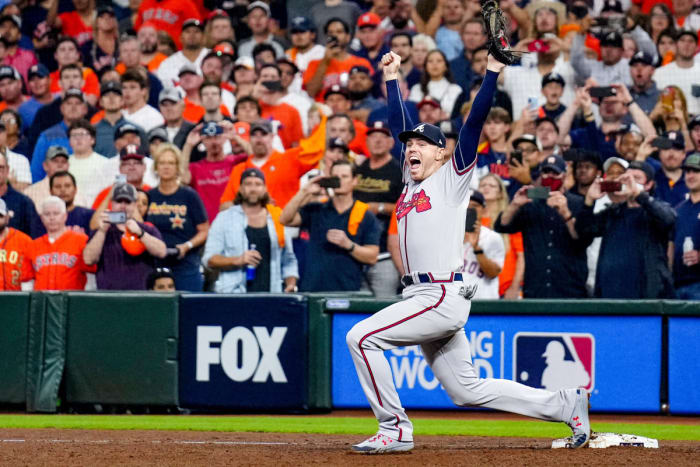
After the Braves won it all last year, Freeman had his eye on history: He tucked the ball from the game-winning out into his back pocket.
Daniel Shirey/MLB Photos/Getty Images
A little girl listens on the radio. She sits along the first base line. She catches her breath and smiles. The game provides players who, like us, must find the grit to carry on, and the grace to let go.
The next time Freeman comes to Atlanta—perhaps as soon as next week—will be different. Easier for Freeman. Harder for the Braves. October baseball is not June baseball.
Back on that night in June, as Rose and I check the standings, she says she misses Freddie. Me, too, I say. It’s not the same, she says. I nod. Maybe tomorrow we’ll talk about how it’s always like that, change.
For now, I tuck her in, turn off the lights and head out to walk the dogs. We stroll through the humid night, under the streetlights, as cicadas sing and sprinklers keep count across the bermuda lawns.
Freddie Freeman found his footing by naming places and people. I begin to stitch together a list of my own. A poem of the essential. You have one, too. A prayer for the night. A bit of words to try out on the dogs.
I start with the streets where we lived. Westwood. White Rock. Patterstone.
I say: Memaw. I say: Mom. I say: Alice, Rose, Grace.
I see a diamond of dirt and outfield green and a deep fly ball to right-center field, reaching for the lights.
It’s one way to say love. Another way to say home.
• Jeff Luhnow’s Next Act: Soccer
• All Eyes on Zion Williamson
• In the World of Phoenix High School Football, ‘S— Is Cutthtroat’






























